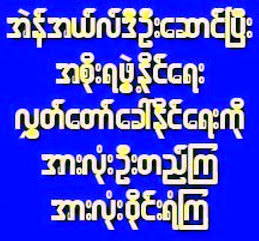Burmese Migrants Keen to Vote in Referendum
By VIOLET CHO
Monday, March 3, 2008, -->
E-MAIL
PRINT
TEXT SIZE
Although Burma’s military government has not made any provisions to include non-resident Burmese citizens in next May’s national referendum, many migrants say they plan to vote “no” to the junta’s recently completed constitution if they are given the chance.
Early last month, the ruling State Peace and Development Council (SPDC) announced plans to hold a referendum on a constitution which critics say is intended to enshrine military control over the country’s political destiny.
In the Thai-Burmese border town of Mae Sot, the Yaung Chi Oo migrant workers’ association is conducting a program to educate Burmese migrants in Thailand about the constitution, which it says is unfair and doesn’t represent the will of the people.
“We have been explaining and asking people to vote against the military referendum if they are allowed to vote,” said Moe Swe, an executive member of Yaung Chi Oo.
He added that even if migrants are denied an opportunity to vote, they can still pass on what they learn to relatives and friends inside Burma, where there is less access to information about the SPDC’s efforts to win mass support for the constitution.
The referendum and an election slated to take place in 2010—part of the junta’s seven-step “road map to democracy”—are expected to be carefully stage-managed to ensure that the regime does not face another humiliating electoral defeat like the one it experienced in 1990, when the opposition National League for Democracy (NLD) won national elections by a landslide.
There are millions of Burmese living outside of the country, but the Burmese regime has yet to indicate whether they will be permitted to take part in the referendum.
More than one million Burmese live in Thailand, where many seem determined to find a way to have their say in their country’s first vote in 18 years. “I am a Burmese citizen, so it is important for me to vote in the referendum,” said Aung Naing Htun, a Burmese migrant working in Mae Sot. “I’ve heard that the government will not allow us [migrants] to vote, but I will try to find a way to vote ‘no’ to the military’s constitution.”
Myint Myat, another Burmese migrant, said that she and her friends have decided to return to their hometown to vote in the referendum. “If the government gives permission for migrants to take part, there are many people who will go back to Burma to vote,” she added.
For some, however, the possible denial of official permission is not the only obstacle. Many are too preoccupied with their day-to-day survival to worry about taking part in the regime’s deliberately opaque political process.
Mae Sot factory worker Mi Nge says that she doesn’t plan to vote, because she doesn’t understand the government-written constitution, and she is too busy trying to make a living to find the time to figure it out.
Burmese living further afield face additional difficulties in exercising their rights. Even those working in parts of Thailand not near the border, such as in the cities of Bangkok and Chiang Mai, say that the cost of returning to Burma to vote would be prohibitive.
There are also sizeable Burmese communities in other parts of Asia, including Singapore, Malaysia, South Korea and Japan. Burmese embassies in these countries say they do not have any clear plan for their citizens who cannot go back to Burma to vote.
Staff at the Burmese embassy in Singapore told The Irrawaddy that they have not been informed of any policy regarding Burmese nationals who want to vote, but who are unable to return to the country.
Burmese embassy staff in Seoul confirmed that there were no plans to enable Burmese living in South Korea to vote, but added that if the right to vote is extended to expatriates, it will only include those who possess legal work permits.
There are large numbers of illegal migrants from Burma living in South Korea and Japan, including many political exiles who are strongly opposed to the junta’s referendum.
One Burmese migrant working legally in a Seoul said he had no interest in the referendum, but said that he would vote “no” if he is forced to cast a ballot by the embassy.
In Singapore, many young Burmese have begun organizing a petition against the military’s constitution. According to an organizer of the campaign, which also calls for elections, about 700 Burmese migrants in the city-state have signed the petition.
All of the signatures will be sent to the Singaporean Parliament and the United Nations Security Council, as well as to other Burmese organizations lobbying against the referendum.
-->
Subscribe to:
Post Comments (Atom)







No comments:
Post a Comment